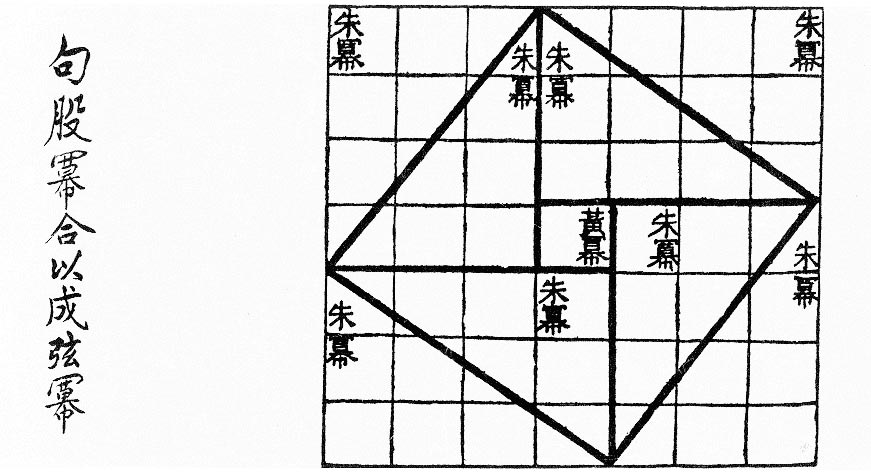 |
| Image source: https://upload.wikimedia.org/wikipedia/commons/c/c3/Chinese_pythagoras.jpg |
I think it is important to acknowledge non-European mathematicians not only so that students see representations of different cultures, but also to give them a clearer sense of how math developed. It's important to show them that there wasn't just one group of people building on work that was solely from their culture, which is a misconception that can easily come about when we only focus on prominent European mathematicians. In addition to this, learning about how different cultures had different prominent ancient texts (e.g. Euclid in Europe, the Jiu Zhang in China etc.) shows how advance math was being worked on for years. Seeing the different cultural contexts attached to the texts makes learning about them feel like an important look at human history and can make students feel more connected to what they're learning about. There is a lot of depth we miss out on by simply telling our students a concept is named after a mathematician or group of people but not talking about those people.
While I believe names can hold significance, I think it's trickier when it comes to older theorems and concepts where it is difficult to pinpoint who discovered it "first." That being said, I think it is better to name concepts and theorems after people to retain the connection to humanity and culture while thinking about math. If the Pythagorean theorem was called the Right Triangle Theorem, it might be easier to remember what it was for within the mathematical realm, but it makes the theorem faceless. Also, as new theorems arose, naming would become considerably harder to the point where theorems and concepts might just become "Right Triangle Theorem 1" and "Right Triangle Theorem 2" etc. In terms of accurately giving recognition to the proper mathematician, I think it has become easier to accurately identify who was the first to prove newer developments. Even if mistakes have been made, there is more evidence and source material available to rectify those mistakes. However, even if there is speculation about Pythagoras being Chinese or other cultures accurately proving the theorem before him, I'm not sure if changing the name would be useful. Instead, I think it would be better to focus on talking about those other cultures and texts, and recognizing that regardless of who ultimately proved a theorem or concept, it is the work of humans and an important part of our development as a species - not just something that belongs to one culture.


Thanks for this very thoughtful blog post about the face(s) of mathematics and their importance (and the dilemmas that arise from this as well).
ReplyDelete